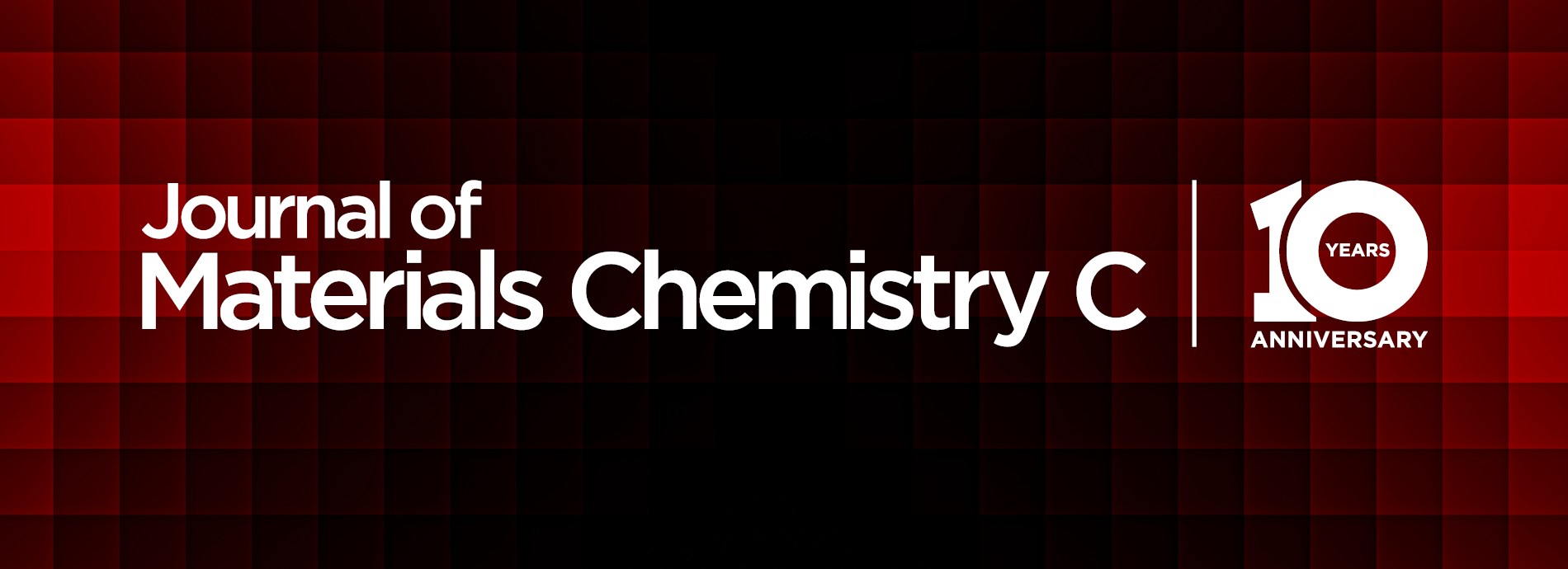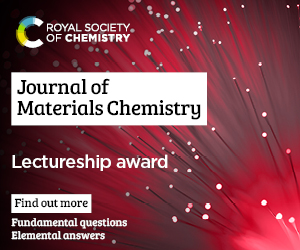You can find details about how to access information remotely in this step-by-step guide. The guide will also help if for any reason you have difficulty accessing the content you want.
What would you like to know about this journal?
Impact factor: 5.7*
Time to first decision (all decisions): 13.0 days**
Time to first decision (peer-reviewed only): 31.0 days***
Editor-in-Chief: Natalie Stingelin
Open access publishing options available
Read and publish in our themed collections
Journal of Materials Chemistry C publishes a number of themed collections every year, guest edited by members of the materials community on timely and important topics.
Read the latest themed collections, including the annual emerging investigator issues.
Interested in contributing your work? Explore the latest open calls for papers in materials science.
Journal scope
Journal of Materials Chemistry A, B & C cover high quality studies across all fields of materials chemistry. The journals focus on those theoretical or experimental studies that report new understanding, applications, properties and synthesis of materials. The journals have a strong history of publishing quality reports of interest to interdisciplinary communities and providing an efficient and rigorous service through peer review and publication. The journals are led by an international team of Editors-in-Chief and Associate Editors who are all active researchers in their fields.
Journal of Materials Chemistry A, B & C are separated by the intended application of the material studied. Broadly, applications in energy and sustainability are of interest to Journal of Materials Chemistry A, applications in biology and medicine are of interest to Journal of Materials Chemistry B, and applications in optical, magnetic and electronic devices are of interest to Journal of Materials Chemistry C. More than one Journal of Materials Chemistry journal may be suitable for certain fields and researchers are encouraged to submit their paper to the journal that they feel best fits for their particular article.
Example topic areas within the scope of Journal of Materials Chemistry C are listed below. This list is neither exhaustive nor exclusive.
- Bioelectronics
- Conductors
- Detectors
- Dielectrics
- Displays
- Ferroelectrics
- Lasers
- LEDs
- Lighting
- Liquid crystals
- Memory
- Metamaterials
- Multiferroics
- Photonics
- Photovoltaics
- Semiconductors
- Sensors
- Single molecule conductors
- Spintronics
- Superconductors
- Thermoelectrics
- Topological insulators
- Transistors
Journal of Materials Chemistry Lectureship
This Lectureship recognises early career researchers, typically within 10 years of attaining their PhD or equivalent degree OR within the first five years of their independent career, who have made significant contributions to the field of materials chemistry.
This lectureship is presented annually. Nominations open in the spring, and the winner is announced in the autumn.
The recipient receives £1,000 to cover travel and accommodation costs to attend and present at a leading international meeting. They are also invited to contribute an article to one of the Journal of Materials Chemistry journals and receive a complimentary cover for the issue in which the article appears.
Find out more
See who's on the team
Meet Journal of Materials Chemistry C's Editor-in-Chief and board members.
Editor-in-chief
Natalie Stingelin, Georgia Institute of Technology, USA
Associate editors
A. S. Achalkumar, Indian Institute of Technology Guwahati, India
Rachel Crespo-Otero, University College London, UK
Renaud Demadrille, Interdisciplinary Research Institute of Grenoble, France
Antonio Facchetti, Georgia Institute of Technology and Northwestern University, USA
Suting Han, The Hong Kong Polytechnic University, Hong Kong
Unyong Jeong, POSTECH, South Korea
Oana Jurchescu, Wake Forest University, USA
Ji-Guang Li, National Institute for Materials Science (NIMS), Japan
Mingzhu Li, Technical Institute of Physics and Chemistry, Chinese Academy of Sciences, China
Martyn McLachlan, Imperial College London, UK
Kasper Moth-Poulsen, Institute of Materials Science of Barcelona, Spain
Ana Flávia Nogueira, University of Campinas, Brazil
Yana Vaynzof, Technical University of Dresden, Germany
Maia G. Vergniory, Max Planck Institute for Chemical Physics of Solids, Germany
Elin L. Winkler, Bariloche Atomic Center and Instituto Balseiro, Argentina
Zhiguo Xia, South China University of Technology, China
Hao-Li Zhang, Lanzhou University, China
Zhenan Bao, Stanford University, USA
Laure Biniek, Institut Charles Sadron - Strasbourg, France
Hugo Bronstein, University of Cambridge, UK
Paola Carbone, University of Manchester, UK
Juan Casado, University of Malaga, Spain
Rajadurai Chandrasekar, University of Hyderabad, India
Lin X. Chen, Northwestern University, USA
Yen-Ju Cheng, National Chiao Tung University, Taiwan
Manish Chhowalla, University of Cambridge, UK
Chunyan Chi, National University of Singapore, Singapore
Laylay Chua, National University of Singapore, Singapore
Przemek Data, Silesian University of Technology, Poland
Olivier Dautel, University of Montpellier, France
Fernando Dias, Durham University, UK
Marc Fourmigué, University of Rennes, France
Gitti Frey, Technion - Israel Institute of Technology, Israel
Aiko Fukazawa, Kyoto University, Japan
Carlos F. O. Graeff, São Paolo State University, Brazil
Mark Green, King's College London, UK
Elizabeth von Hauff, Fraunhofer Institute for Electron Beam and Plasma Technology (FEP) and TU Dresden, Germany
Luis Hueso, CIC nanoGUNE, Spain
Sandrine Heutz, Imperial College London, UK
Cheol Seong Hwang, Seoul National University, Korea
Malika Jeffries-El, Boston University, USA
Anna Köhler, University of Bayreuth, Germany
Hua Kuang, Jiangnan University, China
Tetsuro Kusamoto, Osaka University, Japan
Monica Lira-Cantú, Catalan Institute of Nanoscience and Nanotechnology, Spain
Maria Loi, University of Groningen, The Netherlands
Yueh-Lin (Lynn) Loo, Princeton University, USA
Seth Marder, University of Colorado Boulder, USA
Marta Mas-Torrent, Institute of Materials Science of Barcelona, Spain
Iain McCulloch, Princeton University, USA
Jovana Milić, University of Fribourg, Switzerland
Rajneesh Misra, Indian Institute of Technology Indore, India
Ellen Moons, Karlstad University, Sweden
Hatsumi Mori, University of Tokyo, Japan
Christian Müller, Chalmers University of Technology, Sweden
Thuc-Quyen Nguyen, University of California, Santa Barbara, USA
Jianyong Ouyang, National University of Singapore, Singapore
Thomas Penfold, Newcastle University, UK
Igor Perepichka, Silesian University of Technology, Poland
Dong Qin, Georgia Institute of Technology, USA
Chad Risko, University of Kentucky, USA
Neil Robertson, University of Edinburgh, UK
Alberto Salleo, Stanford University, USA
Paolo Samori, University of Strasbourg, France
Clara Santato, Polytechnique Montréal, Canada
Angela Sastre-Santos, Miguel Hernández University of Elche, Spain
David Scanlon, University of Birmingham, UK
Udo Schwingenschlögl, King Abdullah University of Science and Technology, Saudi Arabia
Ram Seshadri, University of California, Santa Barbara, USA
Roberta Sessoli, University of Florence, Italy
Carlos Silva, Georgia Institute of Technology, USA
Peter Skabara, University of Glasgow, UK
Yanlin Song, Institute of Chemistry, CAS, China
Jadranka Travaš-Sejdić, University of Auckland, New Zealand
Alessandro Troisi, University of Liverpool, UK
Koen Vandewal, Hasselt University, Belgium
Christoph Weder, University of Fribourg, Switzerland
Gregory Welch, University of Calgary, Canada
Wai-Yeung Wong, The Hong Kong Polytechnic University, Hong Kong
Yadong Yin, University of California Riverside, USA
Anatoly Zayats, King's College London, UK
Xiaowei Zhan, Peking University, China
Qichun Zhang, City University of Hong Kong, Hong Kong
Ni Zhao, Chinese University of Hong Kong, Hong Kong
Michaela Mühlberg, Executive Editor ORCID 0000-0002-3468-280X
Geraldine Hay, Deputy Editor
Jonathon Watson, Editorial Production Manager
Natalie Cotterell, Development Editor
Rose Wedgbury, Development Editor
Daniella Ferluccio, Associate Editorial Manager
Matthew Blow, Publishing Editor
Juan Gonzalez, Publishing Editor
Sam Howell, Publishing Editor
Evie Karkera, Publishing Editor
Shruti Karnik, Publishing Editor
Carole Martin, Publishing Editor
Kirsty McRoberts, Publishing Editor
Manman Wang, Publishing Editor
Amy Cook, Editorial Assistant
Jane Paterson, Publishing Assistant
Sam Keltie, Publisher, Journals, ORCID 0000-0002-9369-8414
Journal of Materials Chemistry Lectureship
This Lectureship recognises early career researchers, typically within 10 years of attaining their PhD or equivalent degree, who have made significant contributions to the field of materials chemistry in their independent academic career.
Find out more about eligibility, how to nominate and deadlines for nomination and announcement.
Find out moreSubmission and assessment process
On submission to the journal, all manuscripts are initially assessed by either a professional Publishing Editor or academic Associate Editor. They make an assessment of whether the manuscript may be suitable for the journal, based on the scope and very high significance and broad general interest criteria required for publication. Only manuscripts that successfully pass these initial assessments will be sent for full peer review, which may be with an Associate Editor. Full details of the initial assessment process can be found with our processes and policies.
The journal follows a single-blind peer review process and articles are typically sent to at least two independent reviewers for evaluation. Professional Publishing Editors and academic Associate Editors are equally responsible for peer review and associated editorial decisions. The team are guided by our Editorial Board who set the scientific standards and guidelines for the journal. Our Editorial Board are all leading scientists who together have expertise across the breadth of materials science.
Transparent peer review
As part of our commitment to transparency and open science, Journal of Materials Chemistry C is now offering authors the option of transparent peer review, where the editor’s decision letter, reviewers’ comments and authors’ response for all versions of the manuscript will be published alongside the article under an Open Access Creative Commons licence (CC-BY).
Reviewers will remain anonymous unless they choose to sign their report.
Open access publishing options
Journal of Materials Chemistry C is a hybrid journal and gives authors the choice of publishing their research either via the traditional subscription-based model or instead by choosing our gold open access option.
Gold open access
For authors who want to publish their article gold open access, Journal of Materials Chemistry C charges an article processing charge (APC) of £3,000 (+ any applicable tax). Our APC is all-inclusive and makes your article freely available online immediately, permanently, and includes your choice of Creative Commons licence (CC BY or CC BY-NC) at no extra cost. It is not a submission charge, so you only pay if your article is accepted for publication.
Learn more about publishing open access.
Open access agreements
If your institution has an RSC open access agreement or APCs for gold open access, publishing in this journal may already be covered.
Use our journal finder to check if your institution has an open access agreement with us.
Please use your official institutional email address to submit your manuscript and check you are assigned as the corresponding author; this helps us to identify if you are eligible under an open access agreement or other APC discounts.
Traditional subscription model
Authors can also publish in Journal of Materials Chemistry C via the traditional subscription model without needing to pay an APC. Articles published via this route are available to institutions and individuals who subscribe to the journal. Our standard licence allows you to make the accepted manuscript of your article freely available after a 12-month embargo period. This is known as the green route to open access.
Readership information
Journal of Materials Chemistry C is a core journal for academic and industrial scientists involved in materials research.
Subscription information
Journal of Materials Chemistry C is part of RSC Gold, Core Chemistry and Materials Science subscription packages.
Online only 2025: ISSN 2050-7534 £2,704 / $4,339
*2023 Journal Citation Reports (Clarivate Analytics, 2024)
**The median time from submission to first decision including manuscripts rejected without peer review from the previous calendar year
***The median time from submission to first decision for peer-reviewed manuscripts from the previous calendar year
Journal of Materials Chemistry C
- Email:
- Send us an email
- Email:
- Send us an email
Share
Advertisement



